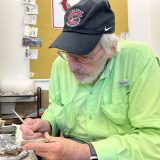Becoming a Machine Learning Scientist Dr. Erik Linstead shares his journey with Experian Consumer Services at its "Creating a Better Tomorrow" event
October 20, 2016
Thanks to a strong partnership with
Experian Consumer Services
and its president, Guy Abramo, Schmid College’s Director of Computer Science Undergraduate Programs and the
Machine Learning and Assistive Technology Laboratory
(MLAT Lab),
Erik Linstead
, lead a talk about his path to becoming a machine learning expert (geek) with 200+ Experian employees a recent company event in Costa Mesa.

Experian Consumer Services President, Guy Abramo, introducing Dr. Erik Linstead.
At the ‘Creating a Better Tomorrow through Machine Learning’ event, Erik shared how his path to becoming an academic professor and researcher started while he was an undergraduate
computer science
major at Chapman University in 1998.
After graduating from Chapman, Erik attended Stanford University, completing his M.S. in Computer Science in 2003. At the time, he thought the challenging part of “big data” was storing it, not analyzing it, and purposefully steered clear of data mining, which he thought was just a fancy word for statistics. That same year he started working at Boeing, the start of a 12-year stint as an embedded software engineer. After 5 years at Boeing, Erik realized to progress to the next level in his career he would need to get his Ph.D, which led him to reach out to Dr. Pierre Baldi at UC Irvine for mentorship. Dr. Baldi was instrumental in introducing Erik to the world of machine learning, and he quickly switched his research focus to finding patterns in data.
As a Ph.D. student at UC Irvine, Erik applied his database knowledge to several research projects, including ChemDB, the largest freely available repository of small molecules and corresponding metadata. Next Erik got involved in the open source software space, specifically, building a platform to index publicly available source code and provide fast searching of that code to find good quality algorithm implementations. He also became the first researcher to apply topic modeling to software source code, co-authoring several papers with Dr. Baldi and collaborator Cristina Lopes which represent the seminal works in this area. This formed the basis of Linstead’s Ph.D. dissertation. Erik finished his Ph.D. in June 2009, exactly 6 days before his daughter, Hannah, was born. He subsequently accepted a full-time instructional position at Chapman at 2010 in order to focus on teaching while continuing his career at Boeing.
In 2012, Hannah was diagnosed with Autism Spectrum Disorder (ASD). Her diagnosis substantially changed Erik’s personal and professional life. Instead of focusing on software engineering research, he decided to combine all of his computational and database experience into machine learning techniques that can gain new insight into ASD.
In January 2015, Erik and a group of talented Chapman undergraduate and graduate students established MLAT Lab. Together, the group explores big data from organizations such as the
Center for Autism and Related Disorders
(CARD) to understand the impact of intensity, therapist credentials, and behavioral subtypes on ASD. Through the MLAT Lab’s research, the app
Smart Dresser
was developed to help girls with ASD learn to dress appropriately for occasions and weather- like not wearing a ski jacket on a 90-degree day. With the establishment of the MLAT Lab, Erik realized he could make a difference by creating things that will help those with ASD on a day to day basis.

Chapman University’s Machine Learning and Assistive Technology Lab Logo.
In May 2015, Erik finally realized that the MLAT Lab needed to be the sole focus of his career, and he left Boeing to assume a tenure-track role at Chapman. While he misses the challenge of writing software for things that fly in space, he knows that Chapman was meant to be his permanent intellectual home. And while it wasn’t the traditional path to an academic career, he feels strongly that his time at Boeing has helped him to set and achieve big goals for MLAT Lab.
“It’s all been a happy accident, I didn’t plan my career this way” – Erik Linstead.
Erik’s story reminds us all to stay inquisitive when it comes to big data and to follow your passions in life. Thanks to support from Experian Consumer Services, MLAT Lab is able to do even more exploratory research into big data sets.


